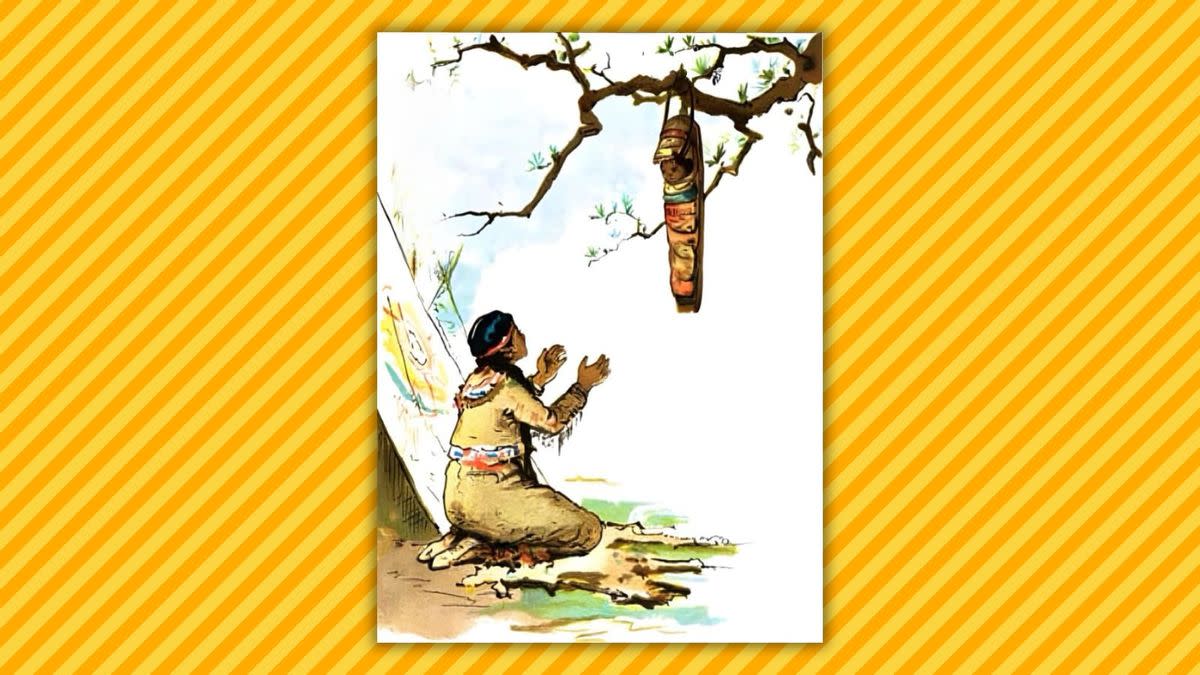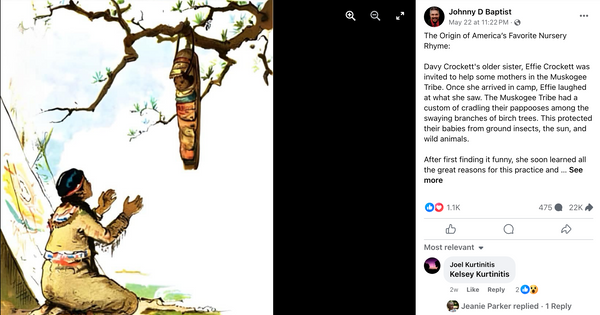Fact Check: Rumor Says 'Rock-a-Bye Baby' Nursery Rhyme Originated from Muskogee Tribe. Here's What We Found

Claim:
The "Rock-a-bye Baby" nursery rhyme originated from the Native American Muskogee tribe's practice of cradling babies in birch trees.
Rating:
In early June 2024, a post went viral on Facebook, allegedly explaining the origin of what it called America's favorite nursery rhyme, "Rock-a-bye Baby."

(Facebook user Johnny D Baptist)
The post was copypasta — text meant to be copied-and-pasted and shared online. The claim spread on social media platforms such as Facebook, LinkedIn, Quora, Instagram, X and TikTok.
The copypasta claimed that Effie Crockett, Davy Crockett's older sister, learned about the Native American Muskogee tribe's practice of cradling babies in birch trees to protect them from insects, the sun and wild animals. Inspired by the sight and the song of a Muskogee mother, the story goes, she translated and shared the lullaby, which later became "Rock-a-bye Baby."
In short, because we found no demonstrable evidence to support the claim that "Rock-a-bye Baby" originated from the Muskogee tribe's practice of cradling babies in birch trees, and the copypasta presumably originated as a groundless rumor, we have rated it as "Unfounded."
The viral copypasta that spread on social media read:
The Origin of America's Favorite Nursery Rhyme:
Davy Crockett's older sister, Effie Crockett was invited to help some mothers in the Muskogee Tribe. Once she arrived in camp, Effie laughed at what she saw. The Muskogee Tribe had a custom of cradling their pappooses [sic] among the swaying branches of birch trees. This protected their babies from ground insects, the sun, and wild animals.
After first finding it funny, she soon learned all the great reasons for this practice and marveled at the beauty of it.
Effie watched the swaying and soothing motion of the topmost branches of the trees. She loved how each baby enjoyed nature, how they listened to the songbirds, observed every ladybug, and smiled at the colors of a butterfly, every little breeze was felt and enjoyed by these young ones; each babe seemed perfectly content.
One of the Tribal mothers began to sing a song to the children in her native tongue. As the Muskogee mother sang, Miss Effie observed a small tear running down the mother's cheek.
Lulu se pepe i le pito i luga o le laau,
A agi le matagi e luluina le moega pepe,
A gau le lala e paʻu ai le moega pepe,
Ma o le a sau i lalo pepe, moega pepe ma mea uma.
Effie translated the words and kept the tune. She shared it with everyone and it soon became a wildly popular nursery rhyme among the Colonies.
The English translation:
Rock-a-bye baby on the tree top,
When the wind blows the cradle will rock,
When the bough breaks the cradle will fall,
And down will come baby, cradle and all.
Why did the Muskogee mother cry?
A "bough" is simply a tree branch, and its breaking was used by the Muskogee mothers as an analogy of their little baby growing up.
Their little baby would soon outgrow his cradle. With each gently rocking wind, time was passing. One day, little baby would no longer need the protection of his mother. One day, the "branch" would break because her little baby had become too heavy. The "cradle" would fall to the earth – the child, no longer a baby, would dust himself off and grow into a man.
The now famous lullaby was first printed in Mother Goose's Melody.
The rest is history.
While many social media users appeared to believe the story, some questioned its authenticity. "The language is Samoan. Sheesh! The crap put on social media is sadly matched by the gullibility of those who believe in and share it," one Facebook user commented. "The 'muskogee' version is actually in Samoan, not a language used by the Muskogee tribe. This is a cute story, but it's not true," a LinkedIn user similarly pointed out.
Google Translator and Translated Labs' Automatic language identifier indicated that the alleged original lyrics of the lullaby shared in the copypasta were indeed written in Samoan, the language of the indigenous Polynesian people of the Samoan Islands.
Other users found issues with the timeline in the copypasta. "Beautiful origin story, except for the fact that Effie Crockett was born about a century after the nursery rhyme was first published in London," one Facebook user noted. Effie Crockett, also known as Effie Canning, was an American actress and composer who lived from 1856 to 1940. She is credited with composing the melody for "Rock-a-bye Baby" in the late 19th century, though the lyrics were published much earlier. Moreover, contrary to the copypasta's claims that she was Davy Crockett's older sister, no reliable sources linked her to the legendary American frontiersman and politician, who lived from 1786 to 1836.
Iona and Peter Opie, folklorists who pioneered the study of childhood culture, published the lullaby's lyrics in "The Oxford Dictionary of Nursery Rhymes" in 1951:
Hush-a-bye, baby, on the tree top,
When the wind blows the cradle will rock;
When the bough breaks the cradle will fall,
Down will come baby, cradle, and all.
The Opies wrote that the lullaby likely dates to the 16th or 17th century:
"Hush-a-bye, baby, on the tree top', the best-known lullaby, is probably not older than the sixteenth century, and legend associates it with the seventeenth. Indeed, the word hushaby is not found in use before 1700, though hush, as in "Hush thee, my babby, lie still with thy daddy', is apparently a backformation of husht and belongs to the sixteenth century. Babby, incidentally, retains the old pronunciation of baby; Shakespeare rhymed babe with drab and slab. Rockaby, the alternative reading in some lullabies, e.g. "Rock-a-bye, baby, thy cradle is green', seems to be a comparatively recent innovation (it is unrecorded by OED), though rock is ancient, even in association with rocking the cradle. Bye, meaning sleep, as in "Bye, baby bunting', "Bye, baby bumpkin', and "Bye, O my baby' dates at least from the ~ fifteenth century, and is still retained in the nursery word byebyes.
The "Hush-a-bye, baby" rhyme is believed to have first appeared in print in the book "Mother Goose's Melody" in 1765:
The best-known lullaby both in England and America, it is regularly crooned in hundreds of thousands of homes at nightfall. The age of both the rhyme and the melody, which is a variant of 'Lilliburlero', is uncertain. The words are first found in Mother Goose's Melody (c. 1765) with the footnote, "This may serve as a Warning to the Proud and Ambitious, who climb so high that they generally fall at last'.
"Imaginations have been stretched to give the rhyme significance," the book continues, revealing theories on the rhyme's origins:
Gerald Massey in Ancient Egypt suggests that the babe is the child Horus. Joseph Ritson states that the opening phrase of his version, 'Bee baw babby lou, on a tree top', is a corruption of the French nurse's threat in the fable, He bas! la le loup! Gosset says, 'On a tree-top-or green boh (bough). Note that boh rhymes with rock, and top fails to do so.' (Boh is a Saxon word.)
The authorship has been attributed to a Pilgrim youth who went over in the Mayflower and who was influenced by the way the Red Indian hung his birch- bark cradle on the branch of a tree. It has been said to be 'the first poem produced on American soil' (Book Lover, 1904). Other American authorities, including Metro Goldwyn Mayer (1944) have seen it as a lampoon on the British royal line in James II's time. In The Scots Musical Museum (1797) appears a nursery song 'O can ye sew cushions?", which Burns submitted. Nearly half a century later (1839) William Stenhouse said that he had heard a second verse of this ditty:
I've placed my cradle on yon holly top,
And aye as the wind blew, my cradle did rock; O hush a ba, baby, O ba lilly loo,
And hee and ba, birdie, my bonnie wee dow.
Hee O! wee O!
What will I do wi' you, &c.
This seems to be another hint that long ago, in Britain, as in other countries, cradles were rocked by wind power. (Cf. also the 1915 quote of 'Bye, baby bunting'.)
An article titled "Rock-a-Bye Baby: 'Down Will Come Baby, Cradle and All'" by Cait Miller, a reference specialist in the music division of the Library of Congress, underscored that the rhyme's lyrics and melody were not created simultaneously:
The lyrics and melody were not born at the same time; the words were initially published in Mother Goose's Melody, printed by John Newbery in London around 1765. Several reprints of Mother Goose's Melody were published in subsequent decades, primarily in and around Boston. It wasn't until the latter half of the 19th century that the song "Rock-a-Bye Baby," as we know it, was composed, and we have New Englander Effie I. Canning to thank for her famous melody. Piecing together Canning's biography and the story of "Rock-a-Bye Baby" proves difficult when reading conflicting articles and interviews from newspaper archives. In fact, a document from the Music Division's Subject File reveals research that a music librarian compiled in 1941 in an attempt to determine Canning's age at the time of her death. Canning's recollection of the song was published in the Daily Boston Globe on January 9, 1938.
The article said Effie Crockett was around 15 years old when her family visited Winthrop, Massachusetts. "While reading on a piazza, she noticed a baby fussing after his mother had set him down in a hammock. In an attempt to soothe the baby, Crockett improvised a melody while singing words she recalled from a book of Mother Goose rhymes," the article said.
So was "Rock-a-Bye Baby" written by a mother? Obituaries confirm that Effie Canning never had any children, but who actually wrote the words? Remember, John Newbery printed the poem in Mother Goose's Melody around 1765. Newbery's publication popularized French folktales as English nursery rhymes (Charles Perrault published Contes de ma mère l'oye in 1697; the Library holds a reproduction of the book's manuscript with accompanying critical text, digitized and available from HathiTrust); Newbery did not write the rhymes himself. Some believe that authorship may lead back to Bertrada II of Laon, mother of Charlemagne and known by nicknames such as "Queen Goosefoot" (likely due to a foot issue).
"Who actually penned the lyrics to 'Rock-a-Bye Baby,' we will never know," the article concluded.
All in all, despite its widespread circulation on social media, no reliable sources support the claims spread in the viral copypasta about Effie Crockett adapting a Muskogee lullaby into the nursery rhyme "Rock-a-bye Baby." The exact origins of the rhyme are still a matter of speculation.
In February 2021, we investigated a similar rumor claiming that the nursery rhyme "The Muffin Man" was inspired by a 16th-century serial killer.
Sources:
Automatic Online Language Identifier. https://translatedlabs.com/language-identifier. Accessed 10 June 2024.
Dapcevich, Madison. "Was 'Muffin Man' Song a Warning to Kids About Serial Killer?" Snopes, 12 Feb. 2021, https://www.snopes.com//fact-check/muffin-man-song-serial-killer/.
Miller, Cait. "Rock-a-Bye Baby: 'Down Will Come Baby, Cradle and All' | In The Muse." The Library of Congress, 7 Dec. 2020, https://blogs.loc.gov/music/2020/12/rock-a-bye-baby-down-will-come-baby-cradle-and-all.
Opie, Iona. The Oxford Dictionary of Nursery Rhymes. Oxford : Oxford University Press, 1977. Internet Archive, http://archive.org/details/oxforddictionary0000opie.
The Opie Archive. https://www.opiearchive.org/. Accessed 10 June 2024.

 Yahoo News
Yahoo News 

